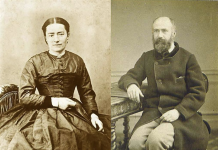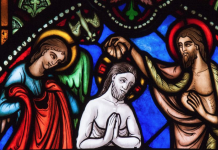
by Cullen Schippe
[CLICK HERE] for a reproducible copy of the Peace Prayer that was composed in the spirit of St. Francis and attributed to him.
Who doesn’t love St. Francis of Assisi?
Francis has been called the universal saint because almost every religious tradition recognizes and honors him. Of all the stories and legends that swirl around this great saint, one of my favorites is the story of St. Francis and the Wolf of Gubbio. It is particularly meaningful for me as a parable of true discipleship for our times.
In capsule form, the story goes like this:
A fierce wolf was terrorizing the town, devouring livestock, even killing the residents. During a visit to the place, Francis strode out to meet the wolf, greeted him as a brother, and confronted him with the harm he was doing. Francis assured the wolf that should he give up his violent ways and protect the town and its people, he would be fed and cared for all of his days.
As a sign of agreement, the wolf placed his paw in Francis’s hand and bowed his shaggy head. On seeing the sincere change in the wolf, the town agreed to the pact. The wolf became a solid citizen of Gubbio, protected the people, and was cared for until the end of his life. When the wolf died, the citizenry deeply mourned his passing.
Francis is a disciple of Christ who knows that not everyone is attuned to the gospel. He knows that there is evil and violence in the world. He knows that there are those who, in the name of Jesus, would crush people who seem to represent evil and turn on them with violence. But what Francis models in this story, as well as in his whole life lived in imitation of Christ, is an evangelization by example—gentle and loving example.
In the taming of the wolf of Gubbio, Francis showed that by receiving forgiveness, enemies could well become friends and, in the act of forgiving, communities become stronger. Francis demonstrated that a disciple who proclaims the gospel firmly but gently, and whose life is in harmony with that gospel, invites conversion—change for the better.
Saint Francis as a model of sanctity is the antithesis of a powerful person. Although he was willing to put his life on the line to speak truth to the powerful, he claimed no power or authority for himself. Just as Jesus did not lay claim to earthly power, Francis—in his discipleship—claimed no title for himself save that of brother.
Although in his youth, Francis sought to be a knight in the service of a great prince, he was called by Christ to become a servant of the greatest Master of all. Barefoot and wearing a simple tunic, he walked throughout a land where riches and the trappings of power infected both Church and state. Francis had a vocation to rebuild Christ’s Church—not with bricks and mortar but with humility, faith, and most of all, joy.
The little poor man of Assisi left a great legacy because he demonstrated to pope and peasant that the gospel could be a way of life, that hatred could be overcome by love, injury by pardon, doubt by faith, despair by hope, darkness by light, and sadness by joy.
Francis sought to console, not to be consoled. He sought to understand, not to be understood. He sought to love, not to be loved. He knew that when he gave of himself, he received so much more. He understood the words of the Lord’s Prayer, which reveal that in forgiving he was forgiven. And he lived the greatest gospel lesson of them all: In dying we are all born to eternal life.
In today’s world, there seems to be some wolf or another at our door every day. It is easy to feel that our lives and our faith are threatened. The lesson of Francis is that many of these wolves may need to be treated with understanding, compassion, and love, that many of those we perceive to be wolves are not wolves at all. They may be struggling folks who need to be approached by an instrument of God’s peace—to hear and see the gospel preached and lived in integrity.
Share stories of the life and times of St. Francis during this month. [CLICK HERE] for a reproducible copy of the Peace Prayer that was composed in the spirit of St. Francis and attributed to him.
Cullen Schippe has been in Catholic publishing for well over 40 years and currently serves as President and Publisher for the Peter Li Education Group. Email Cullen at cschippe@peterli.com.
The Windows update prank can easily trick someone when opened in full screen. It looks and acts like a real install page.
Copyright 2012, Bayard, Inc. All rights reserved. This article is protected by United States copyright and other intellectual property laws and may not be reproduced, rewritten, distributed, redisseminated, transmitted, displayed, published or broadcast, directly or indirectly, in any medium without the prior written permission of Bayard, Inc.
This article was written by the Catechist Staff and appeared in Catechist magazine, September 2012.
Image Credit: Shutter Stock 136124996




